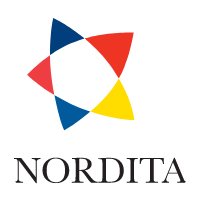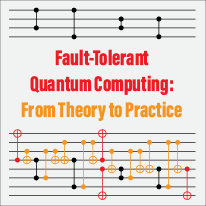Venue
Room 4205, Floor 4, House 3, Albano Campus
Nordita, Stockholm, Sweden
Scope
There is an enormous international effort to build a large-scale quantum computer. Underlying the development of such a device is fault-tolerant quantum computing. This field brings together key ideas from theoretical physics, information theory and computer science to show how to overcome the errors a quantum information processing system will experience due to its interactions with the environment. Recent experimental breakthroughs have provided the first stepping stones, showing that it is possible to scale down error rates by scaling up the complexity of the error correcting code in real devices. Nevertheless, challenges are daunting and further progress will depend on close interactions between physicists that design and build quantum devices and others that work on developing new fault-tolerant codes and algorithms. Our program will bring together international experts working in quantum devices and fault tolerance to explore recent technological and theoretical developments. This will build on some core research strengths in the Nordic region where, for many years, researchers have invested heavily in the development of theoretical and experimental quantum optics and superconducting devices, among others. In addition to seminars on state-of-the-art quantum computing research, the program will include tutorials to train young researchers in the Nordic region with modern ideas in quantum computing and quantum hardware. This will help to inspire collaborations between Nordic researchers and the rest of the world to work towards the goal of building a fault-tolerant quantum computer.
Themes and preliminary program schedule
The following main themes over the three weeks mix specific experimental platforms together with different disciplines within the field of quantum error correction. The themes are flexible and may change depending on interests of the participants.
Week 1 themes:
- Quantum error-correction basics: Stabilizer codes, concatenated codes, subsystem codes
- Rydberg atoms and ions
- Trapped ion architectures
- Quantum low-density parity check (LDPC) codes
Week 2 themes:
- Superconducting transmon qubits
- Decoding algorithms
- Fault-tolerant quantum computing: logic gates
Week 3 themes:
- Bosonic qubits
- Linear optical quantum computing architectures
- Tailored codes for biased noise
- Quantum dot architectures
Confirmed participants
| Name | Home Institute |
| Victor V. Albert | QuICS @ NIST & UMD College Park |
| Tomasz Andrzejewski | TU Wien Atominstitut |
| Tenzan Araki | University of Oxford |
| Asmae Benhemou | University College London |
| Ilya Besedin | ETH Zurich |
| Dolev Bluvstein | Harvard |
| Ben Brown | IBM Quantum |
| Kenneth Brown | Duke University |
| Earl Campbell | Riverlane & University of Sheffield |
| Aliki Capatos | Bristol University |
| Francesco Cesa | IQOQI Innsnruck |
| Ashwathkumaran Chandarvairavan | KTH |
| Anasua Chatterjee | Delft University Of Technology |
| Kaustav Chatterjee | Technical University of Denmark |
| Susan Chen | University of Bristol/University of Copenhagen |
| Ben Criger | Quantinuum |
| Guillaume Dauphinais | Xanadu |
| Sergiy Denysov | Oslo Metropolitan University |
| Huyen Do | Aalto University |
| Aleksandr Dorogov | Centre for Quantum Technologies, National University of Singapore |
| Alec Eickbusch | Google Quantum AI |
| Simon Evered | Harvard University |
| Edy Alberto Flores Leal | KTH Royal Institute of Technology |
| Giacomo Fregona | University of Copenhagen |
| Anton Frisk Kockum | Chalmers University of Technology |
| Yvonne Gao | National University of Singapore |
| Gyorgy Geher | Riverlane |
| Steven Girvin | Yale University |
| Ferrini Giulia | Chalmers |
| Joseph Goodwin | University of Oxford |
| Ben Graham | University of Copenhagen/University of Bristol |
| Mats Granath | University of Gothenburg |
| Robin Harper | The University of Sydney |
| Timo Hillmann | Chalmers University of Technology |
| Marius Hope | University of South-Eastern Norway |
| Michael Kastoryano | University of Copanhagen |
| Eleanor Kneip | University College London |
| Xanda Kolesnikow | University of Sydney |
| Stefan Krastanov | University of Massachusetts Amherst |
| Aleksander Kubica | Yale University |
| Constance Laine | University College London |
| Moritz Lange | University of Gothenburg, WACQT |
| Anthony Leverrier | Inria |
| Jesper Lind-Olsen | University of Oslo |
| Matthias Löbl | University of Copenhagen (from April 2025: Sparrow Quantum) |
| Surabhi Luthra | University College London (UCL) |
| Isak Lyngfelt | Chalmers University of Technology |
| Arshpreet Maan | Aalto University |
| Delphine Martres | University of Oslo |
| Anthony Micciche | University Of Massachusetts Amherst |
| Ioana Moflic | Aalto University |
| Alexander Müller-Hermes | University of Oslo |
| Kae Nemoto | Okinawa Institute of Science and Technology |
| Mohammad Nobakht | University of Sydney |
| Stefano Paesani | NIels Bohr Institute |
| Alexandru Paler | Aalto University |
| Leonid Pryadko | Google Quantum AI and UC, Riverside |
| Harry Putterman | AWS Center for Quantum Computing |
| Armanda Quintavalle | Freie Universität Berlin |
| Maximilian Rimbach-Russ | QuTech and Kavli Institute of Nanoscience, Delft |
| Ludvig Rodung | Chalmers University of Technology |
| Kaavya Sahay | Yale University |
| Ludwig Schmid | Technical University of Munich |
| Volodymyr Sivak | Google Quantum AI |
| Basudha Srivastava | Quantinuum |
| Giovanna Tancredi | Chalmers |
| Jeff Thompson | Princeton University |
| Mark Turner | Riverlane |
| Adithi Udupa | Chalmers University of Technology |
| Peter van Loock | Mainz University |
| Liam Veeder-Sweeney | University of Edinburgh |
| Aislin Wells | University of Sydney |
| Stanislaw Wolanski | University College London / Riverlane |
| Ted Yoder | IBM |
| Zeidan Zeidan | Chalmers University of Technology |
Accommodation
Please note that we are not soliciting travel and accommodation details details from participants. Any such emails at this point are spam/fraud. We will sent out invitations for registrations before arranging accommodations.
Travel support
Travel support is limited, but maybe available on request to the organizers.
Application/Registration
There is a limited number of openings for additional participants that can support their own travel and accommodation. It may be that we find additional budget for junior applicants that do not have their own support to attend. We encourage applicants in this situation to mention that they need support to attend in the comments of the application form, and we will see if we can accommodate this. Application/registration
Deadline for applying is April 15th.
Code of Conduct
All participants are expected to uphold our Code of Conduct, which aims to foster a harassment-free environment where everyone feels comfortable engaging in both scientific and social activities
Sponsored by:

![]()

